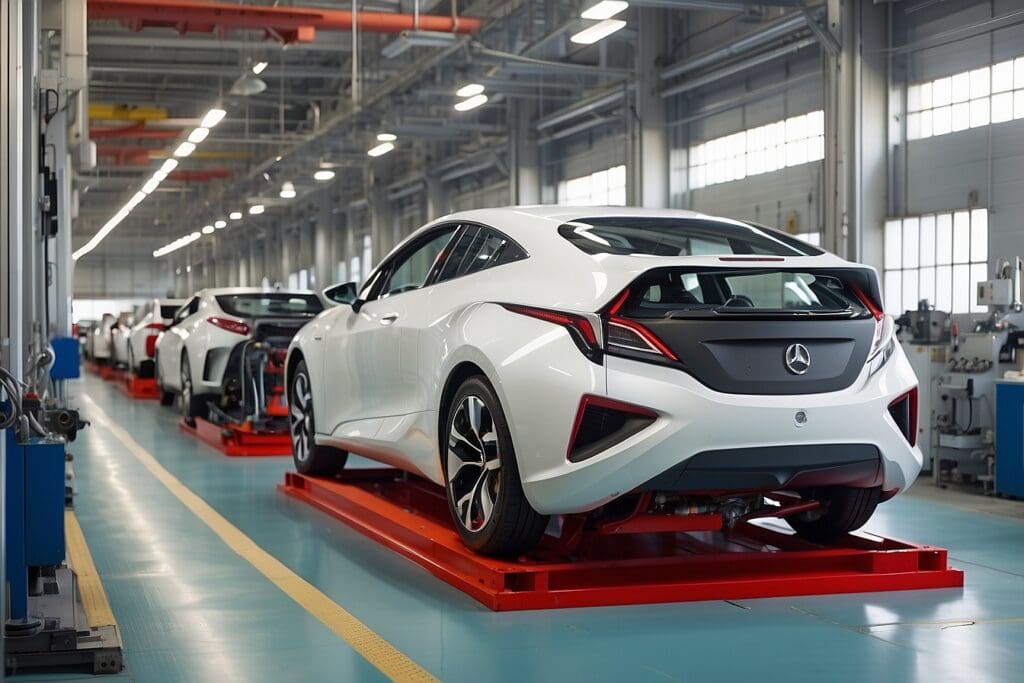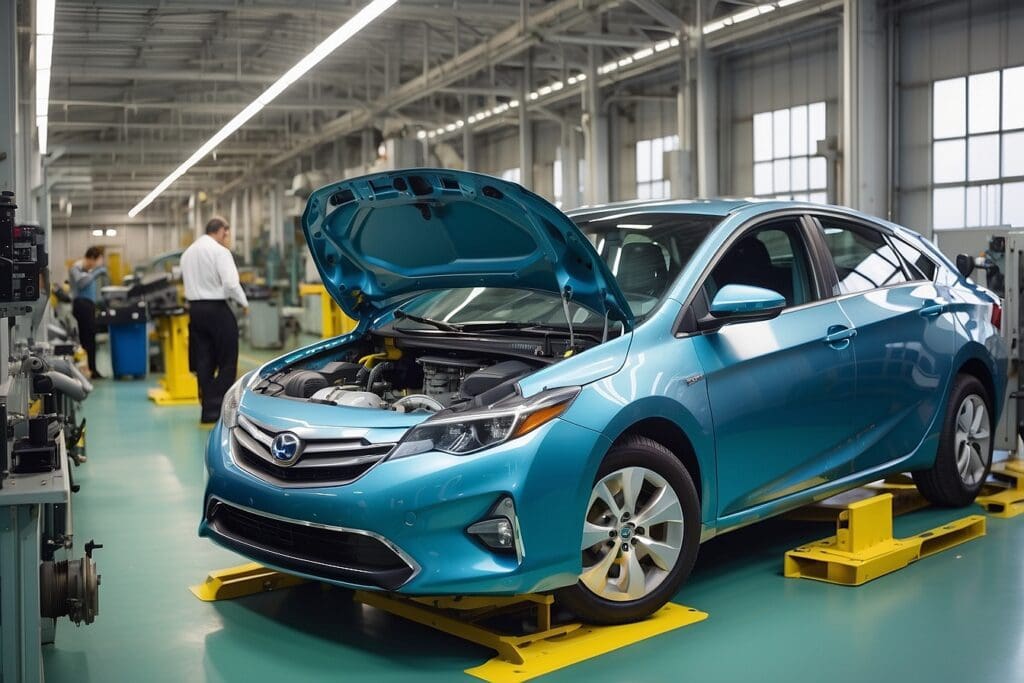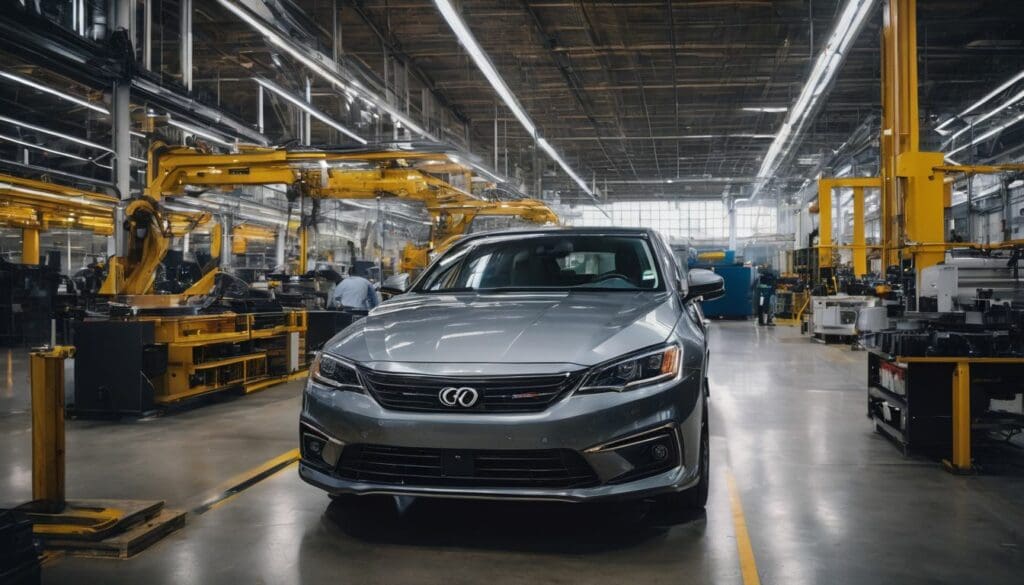We all share the dream of breathing in fresher air and nurturing a more verdant world, yet it can’t help but feel like our beloved motors are steering us down a rather conflicting path.
Rest assured, you’re not alone on this green voyage – our team is just as fervent about embracing lower emissions and has been thoroughly exploring the realm of eco-innovations. We’re poised to guide you through the sustainable advancements currently reshaping car manufacturing.
So let’s gear up together for a future that’s promisingly cleaner!
Key Takeaways
- Car manufacturers are using sustainable materials like recycled plastics and bamboo to create greener vehicles, reducing carbon emissions and reliance on non-renewable resources.
- Governments offer incentives such as tax credits for making low – emission cars, encouraging the industry to focus on sustainability and environmental responsibility.
- Consumer demand for eco – friendly products is rising; people want cars that have a smaller environmental impact which pushes companies to adopt new, green practices.
- 3D printing technology in auto manufacturing allows for more precise production with less waste, using biodegradable or recycled materials efficiently.
- The automotive industry is adopting digital technologies and forming strategic partnerships to enhance efficiency and foster innovation in developing sustainable manufacturing methods.
Government Interventions in the Automotive Industry

The government has implemented legislation to promote sustainability and provide incentives for eco-friendly initiatives in the automotive industry. These measures aim to reduce carbon footprint and encourage environmentally friendly practices.
Legislation promoting sustainability
Governments worldwide are stepping up with laws that encourage car manufacturers to reduce their environmental impact. By setting strict emissions targets and offering financial support for research into eco-friendly production methods, they’re making it clear: sustainability is no longer optional.
We’re seeing rules that mandate the use of renewable energy sources in factories and impose penalties for excessive waste.
We know we have to adapt quickly. Our designs now prioritise materials that lower our carbon footprint, and every step in our value chains is scrutinised for environmental efficiency.
Legislation is not just a hurdle; it’s a catalyst driving us towards greener manufacturing solutions that align with ESG (Environmental, Social, and Governance) criteria. As these legal frameworks become more robust, we commit ourselves to exceed standards and lead the charge in creating a sustainable environment within the automotive industry.
Incentives for eco-friendly initiatives
To drive eco-friendly initiatives forward, governments worldwide offer a range of incentives to encourage automotive manufacturers to prioritise sustainability. These include tax credits for producing low-emission vehicles, grants and subsidies for research and development in clean technology, as well as funding for the implementation of sustainable production methods.
By offering these financial incentives, governments aim to steer auto manufacturers towards embracing environmentally friendly practices while reducing their carbon footprint. Incorporating renewable energy utilisation or utilising sustainable materials can also make companies eligible for additional benefits such as reduced tariffs or access to government contracts in some cases.
Strategic partnerships with suppliers focused on environmental sustainability result in cost savings through waste reduction while ensuring a resilient supply chain. This approach promotes long-term profitability and resilience by minimising exposure to price volatility associated with scarce natural resources.
Changing Consumer Expectations
Consumers are increasingly demanding more sustainable products, and this has led to a push for transparency and ethical practices within the automotive industry. As awareness of environmental issues continues to grow, consumers are expecting auto manufacturers to prioritise sustainability in their manufacturing processes.
Demand for more sustainable products
Consumers are increasingly seeking eco-friendly options, leading to a rising demand for more sustainable products in the automotive industry. They prioritise vehicles with lower carbon footprints and energy-efficient features, influencing manufacturers to innovate using sustainable materials and production methods.
This push for sustainability is shaping the future of auto manufacturing towards greener practices, aligning with climate change mitigation strategies and environmental conservation efforts.
As auto manufacturers respond to the demand for more sustainable products, they must integrate eco-friendly initiatives into their processes while ensuring high product quality and performance.
Adapting to changing consumer expectations is essential for staying competitive in an evolving market focused on environmental sustainability within the automotive industry.
Push for transparency and ethical practices
After demanding more sustainable products, it’s essential to push for transparency and ethical practices in the auto manufacturing industry. This means advocating for clear information about the environmental impact of vehicles, as well as ensuring that ethical labor practices are followed throughout the supply chain.
By doing so, we can hold manufacturers accountable and make informed decisions about which companies align with our values.
Transparency also promotes trust between consumers and auto manufacturers, ultimately enabling us to make choices that support a sustainable future within the automotive industry. Therefore, it’s crucial for companies to embrace honesty and integrity in their production processes while actively working towards reducing their carbon footprint and embracing eco-friendly production methods.
Incorporating Sustainable Materials in Vehicle Manufacturing
We’ll discuss the benefits of using sustainable materials in auto manufacturing, the types of sustainable materials being used, and how 3D printing technology is being integrated to reduce waste and energy consumption.
Benefits of sustainable materials
Using sustainable materials in auto manufacturing offers numerous benefits. These materials help in reducing the environmental impact of vehicle production, leading to lower carbon emissions and decreased reliance on non-renewable resources.
Additionally, they contribute to energy efficiency and facilitate the creation of low-emission vehicles. Sustainable materials also promote ethical practices and transparency throughout the supply chain, aligning with changing consumer expectations for eco-friendly products and green manufacturing processes.
Furthermore, integrating sustainable materials stimulates innovation in the automotive industry, fostering a shift towards more environmentally conscious production methods. This not only supports conservation efforts but also encourages manufacturers to adopt greener technologies for a more sustainable future in auto manufacturing.
Types of sustainable materials used

In sustainable auto manufacturing, several types of materials are used to reduce environmental impact and promote eco-friendly production methods. These materials include:
- Recycled plastics: Utilising recycled plastics in vehicle components reduces the demand for new plastic production, contributing to a decrease in carbon footprint.
- Bamboo-based materials: Bamboo is a fast-growing, renewable resource that can be used for interior panelling and upholstery, offering a more sustainable alternative to traditional materials.
- Bio-based composites: These materials are derived from natural sources such as soya bean, cornstarch, or flax fibres, providing strength and durability while reducing reliance on non-renewable resources.
- Natural fibre composites: Incorporating fibres from sources like hemp or kenaf into vehicle components results in lightweight yet sturdy materials that have a lower environmental impact compared to traditional options.
- Aluminium and magnesium alloys: These lightweight metals are recyclable and energy-efficient to produce, making them ideal for increasing fuel efficiency in vehicles while minimising environmental impact.
Integration of 3D printing technology
We explore how auto manufacturers are integrating 3D printing technology into their production processes. Sustainable materials, such as biodegradable filaments and recycled plastics, can be used in 3D printers to create vehicle components.
This innovative approach reduces waste and energy consumption during manufacturing, contributing to a more eco-friendly production method in the automotive industry.
Furthermore, 3D printing allows for on-demand production of parts, minimising excess inventory and facilitating sustainable supply chain management. By embracing this cutting-edge technology, automakers are taking significant steps towards reducing their carbon footprint while pushing the boundaries of innovation for sustainable automotive manufacturing.
Strategies for a Sustainable Future in Auto Manufacturing
We will explore the innovative strategies being implemented to balance profitability with sustainability, including digital transformation, collaboration for sustainable initiatives, and the latest trends shaping the future of sustainability in the auto manufacturing industry.
Balancing the bottom line with sustainability
To balance the bottom line with sustainability, auto manufacturers must innovate and integrate eco-friendly production methods. By harnessing digital transformation, companies can enhance efficiency and reduce waste across their operations.
Collaborating with like-minded partners to develop sustainable initiatives is key in creating a more environmentally conscious automotive industry.
Moreover, by embracing trends that shape the future of sustainability in the sector, such as low-emission vehicles and carbon footprint reduction strategies, manufacturers can meet consumer expectations for ethical and transparent practices while driving towards a greener tomorrow.
Digital transformation for better efficiency and waste reduction
To achieve better efficiency and reduce waste in auto manufacturing, we are implementing digital transformation. This involves leveraging advanced technologies such as robotics and AI to streamline production processes.
By adopting connected systems and automation, we can optimise resource utilisation and minimise material wastage. Additionally, predictive analytics enables us to forecast maintenance needs accurately, reducing downtime and enhancing operational efficiency.
Embracing digital tools also allows for real-time monitoring of energy consumption, leading to more sustainable practices and reducing environmental impact.
Collaborations and partnerships for sustainable initiatives
We, as environmentally conscious individuals, have seen the power of collaborations and partnerships in driving sustainable initiatives forward. These alliances promote innovation, thought leadership, and resource sharing crucial for the advancement of eco-friendly practices within the automotive industry.
- Forming partnerships with suppliers who prioritise sustainability allows for the procurement of eco-friendly materials and resources essential for low-emission vehicles.
- Collaborating with research institutions and universities fosters the development of groundbreaking ecofriendly production methods and innovation strategies that can transform the industry.
- Partnering with non – governmental organisations (NGOs) and environmental advocacy groups can provide valuable insights into environmental sustainability in automotive manufacturing, ensuring that business decisions align with conservation goals.
- Engaging in cross – industry collaborations opens doors to novel approaches to integrating sustainable technologies and practices into auto manufacturing processes, amplifying the collective impact.
- Building alliances with other automotive companies creates opportunities for sharing best practices and collectively pushing towards a more sustainable future within the industry.
Trends shaping the future of sustainability in the industry
- Advancements in Electric Vehicle Technology: The rise of electric vehicles (EVs) is accelerating, driven by improved battery technology, expanded charging infrastructure, and consumer demand for low-emission transport.
- Circular Economy Principles: Manufacturers are embracing circular economy models, focusing on designing products for reuse, remanufacturing, and recycling to minimise waste and resource consumption.
- Adoption of Autonomous Vehicles: The development of autonomous vehicles presents opportunities for more efficient transport systems, reduced traffic congestion, and lower emissions through optimised driving patterns.
- Integration of Renewable Energy: Auto manufacturers are increasingly incorporating renewable energy sources into their operations to reduce carbon footprint and energy consumption during production processes.
- Innovation in Sustainable Materials: There is a growing emphasis on exploring and utilising innovative sustainable materials such as bioplastics, natural fibres, and bio-based composites to reduce the environmental impact of vehicle manufacturing.
- Emphasis on Lifecycle Assessments: Companies are focusing on conducting comprehensive lifecycle assessments to evaluate the environmental impacts of their products from raw material extraction to end-of-life disposal.
- Digitalisation and Smart Manufacturing: The adoption of digital technologies such as IoT (Internet of Things), AI (Artificial Intelligence), and data analytics is enabling more efficient production processes and enhanced resource management.
Conclusion.
Striving for sustainability in auto manufacturing is crucial for the conservation of resources and reduction of environmental impact. As environmentally conscious individuals, we must continue to advocate for the use of sustainable materials and low-emission vehicles in the automotive industry.
By supporting eco-friendly initiatives and demanding transparency from manufacturers, we can push for a future where ethical practices are integrated into every aspect of vehicle production.
Embracing sustainable strategies within auto manufacturing not only benefits the environment but also contributes to a healthier and more efficient industry. Our commitment to promoting environmental sustainability in automotive manufacturing will drive positive change, shaping a future where eco-friendly practices are standard across the entire sector.
FAQs
1. What are sustainable practices in auto manufacturing?
Sustainable practices in auto manufacturing involve using eco-friendly materials, reducing waste, and creating low-emission vehicles to support environmental sustainability.
2. Why is environmental sustainability important in the automotive industry?
Environmental sustainability in the automotive industry cuts down on pollution, conserves resources, and ensures that car making doesn’t harm our planet.
3. Can cars be made with sustainable materials and resources?
Yes, many manufacturers now use sustainable materials like recycled plastics for parts and renewable energy resources to power production lines.
4. What are low-emission vehicles and why are they significant?
Low-emission vehicles produce fewer pollutants than traditional cars, playing a crucial role in cutting emissions and fighting climate change.





